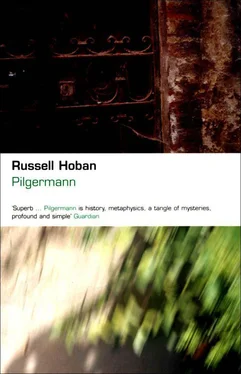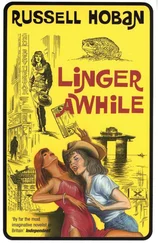Russell Hoban - Pilgermann
Здесь есть возможность читать онлайн «Russell Hoban - Pilgermann» весь текст электронной книги совершенно бесплатно (целиком полную версию без сокращений). В некоторых случаях можно слушать аудио, скачать через торрент в формате fb2 и присутствует краткое содержание. Год выпуска: 2002, Издательство: Bloomsbury Publishing PLC, Жанр: Современная проза, на английском языке. Описание произведения, (предисловие) а так же отзывы посетителей доступны на портале библиотеки ЛибКат.
- Название:Pilgermann
- Автор:
- Издательство:Bloomsbury Publishing PLC
- Жанр:
- Год:2002
- ISBN:нет данных
- Рейтинг книги:5 / 5. Голосов: 1
-
Избранное:Добавить в избранное
- Отзывы:
-
Ваша оценка:
- 100
- 1
- 2
- 3
- 4
- 5
Pilgermann: краткое содержание, описание и аннотация
Предлагаем к чтению аннотацию, описание, краткое содержание или предисловие (зависит от того, что написал сам автор книги «Pilgermann»). Если вы не нашли необходимую информацию о книге — напишите в комментариях, мы постараемся отыскать её.
Pilgermann — читать онлайн бесплатно полную книгу (весь текст) целиком
Ниже представлен текст книги, разбитый по страницам. Система сохранения места последней прочитанной страницы, позволяет с удобством читать онлайн бесплатно книгу «Pilgermann», без необходимости каждый раз заново искать на чём Вы остановились. Поставьте закладку, и сможете в любой момент перейти на страницу, на которой закончили чтение.
Интервал:
Закладка:
We both stood looking at the chalk lines on the tawny stone. Having spoken the words we had just spoken we now found in our minds the next thought: the actions that would take place on those tiles that were not yet made, were those actions also waiting in the paving-stones that would then be under the tiles?
Bembel Rudzuk measured the three different triangles that in their multiples made up Hidden Lion and wrote down his measurements on a sheet of paper which he put into his document case.
‘When can we start?’ I said.
As I spoke the shadow of the wooden rod faded into the tawniness of the stone. We both looked up at the grey sky.
‘In the spring,’ said Bembel Rudzuk, ‘when the rains are over.’
I felt like a child deprived of a treat. I wanted something to happen immediately, I felt that such manhood as now remained to me could only live so long as there was action to nourish it. I stretched out my arms towards the corners of the stone square, trying to pull into myself the power that radiated from the centre and passed beyond the outer limits of the paving to infinity.
A small boy walked on to the stone at a corner of the square. He looked sharp and hungry, like a fox. Like a fox, wary and watchful, he came slowly step by step from the corner towards the centre, walking as one walks on thin ice; perhaps he was counting. At a certain point he stopped, knelt on the stone, and began to draw on it, first with a bit of charcoal then with red ochre. What he drew was a triangle with a short base and long sides; it was irregularly divided into pointed red and black shapes, some triangular, some diamond-shaped, unevenly massed and drawn all skewed and crooked, like scales on a deformed serpent; from base to apex there ran up the middle, like spines, a line of black diamond shapes. Near the triangle he drew a lopsided circle made up of other black and red shapes, masses of black, slivers of red; it suggested the giant eye of an unimagined insect. From this eye emanated red and black arrows.
I walked over to the boy. I had learned to say in Arabic, ‘What is this called?’ and now I pointed to his design and said this to him.
He looked up at me attentively and shook his head.
I said in Greek, ‘What is this called? What is it meant to be?’
Again he shook his head, still looking at me attentively.
‘Did you understand me?’ I said.
He nodded.
‘Are you able to speak?’ I said.
He shook his head. Had his speech been castrated? Had his tongue been cut out? I didn’t want to ask why he was unable to speak. Had he made a vow of silence?
Still looking at me with that same serious attention he held out his left hand with the fingers outspread and curved as if holding a sphere, then he slowly rotated his wrist. Having done this he stood up and walked back as he had come: first to the corner of the paved square then away into the town.
Then the grey sky opened and down came the rain. As it poured down and drenched me to the skin my heart leapt up to meet it, I didn’t know why. That rain, the prospect of which had only a moment before filled me with despair, was now bringing me ease and refreshment.
Under that drenching rain we went to the brickyard. There was little to be seen but an expanse of mud leaping up in points, a little square mud-brick building with a dome, and two or three little square ziggurats that I took to be kilns. In the doorway of the mud-brick building lounged a little moon-faced man of fifty or so; his face was contemplative and serene.
‘This brickmaster,’ said Bembel Rudzuk, ‘this lord of the bricks, his name is Bab el-Burj, Tower Gate. He used to be a slave and his name was Efficiency.’
‘Why is his name now Tower Gate?’ I said. ‘I prefer to avoid people and boats with symbolic names if I can.’
‘There’s no symbolism in it that I know of,’ said Bembel Rudzuk; ‘he simply liked the wordplay of Bab el-Tower, that’s all.’
‘No bricks,’ said Tower Gate when we stood before him. ‘As you see, I have no bricks whatever, I have only the emptiness left behind by a great many bricks. I am contemplating this emptiness.’
‘May we contemplate it as well?’ said Bembel Rudzuk.
‘I don’t think there’s enough for the three of us,’ said Tower Gate. ‘Let me offer you rather some coffee.’
The interior of the little mud-brick building was sumptuously carpeted and adorned with gorgeous hangings and cushions. Bembel Rudzuk and I sat down while a puddle formed around us and Tower Gate prepared coffee. He had no servant with him nor were there any workmen to be seen.
‘Strange, is it not,’ said Tower Gate, ‘that in the Quran there is no chapter called “The Kiln” or “The Oven”? It’s such a good metaphor, it lends itself so well to metaphysics.’
‘There’s the Jonas chapter,’ said Bembel Rudzuk: ‘he went into the whale and came out of the whale as a brick goes into and comes out of the kiln.’
‘Jonas was half-baked,’ said Tower Gate; ‘he was still unfinished and without wisdom when the whale vomited him up. No, as a metaphor Jonas is not in a class with bricks.’ Tower Gate was given to making what might be called ‘Aha!’ and ‘Oho!’ gestures with his hands, and so he gestured now. ‘Neither is bread,’ he said (‘Oho!’ said his hands): ‘bread is baked and eaten and becomes excrement. Brick, which is bread of earth, bread of our origins, is also baked — like Abraham it is put into the fire and like him it emerges hard and enduring, ready to shelter the humble and the mighty both.’ (‘Aha!’ said his hands.) ‘It is eaten by time but only slowly, slowly through the alternating dawns and darks of this continuous demonstration that we call the world. No excrement.’
‘You have given me so much to think about that I cannot remember what I came to see you about,’ said Bembel Rudzuk.
‘Bricks?’ said Tower Gate.
‘Ah!’ said Bembel Rudzuk. ‘You read my mind.’ He took out of his document case the drawing in which I had repeated the Hidden Lion pattern and showed it to Tower Gate.
‘Oho!’ said Tower Gate with his voice and his hands both. ‘The Willing Virgin!’
‘What willing virgin?’ said Bembel Rudzuk.
‘This pattern that you show me,’ said Tower Gate, ‘it’s called “The Willing Virgin”.’
‘Why?’ I said.
‘Because the next time you look there’s something different about it,’ he said. ‘Of course that’s true of many patterns but this is the one with that name. Had you another name for it?’
‘Hidden Lion,’ I said. I wasn’t able not to say it although I had wanted the name to be known only to Bembel Rudzuk and me.
‘Aha!’ said Tower Gate. ‘Very good indeed! The lion is hidden in the willing virgin; after all who can say no to a lion?’
All of us pondered this for several moments.
‘How big are the big triangles?’ said Tower Gate.
‘Nine and a half inches to a side,’ said Bembel Rudzuk.
Tower Gate took my right hand, spread it out, and measured the span with an ivory ruler. ‘Aha!’ he said. ‘Nine and a half inches! Had you noticed that?’
‘No,’ I said.
‘Your design?’ he said to me.
‘Yes,’ I said.
‘You’re going to put this pattern on that empty square of yours?’ said Tower Gate to Bembel Rudzuk.
‘Yes,’ said Bembel Rudzuk.
‘It’s good that you come to me now,’ said Tower Gate. ‘I can think about it over the winter and I’ll tell you in the spring.’
‘Tell us what?’I said.
‘Whether I want to have anything to do with it,’ he said.
‘Why does it need so much thinking?’ I said.
Tower Gate looked at me as if he thought that talking to me might be a waste of time. ‘You’re dealing with infinity,’ he said. ‘I suppose you know that?’
Читать дальшеИнтервал:
Закладка:
Похожие книги на «Pilgermann»
Представляем Вашему вниманию похожие книги на «Pilgermann» списком для выбора. Мы отобрали схожую по названию и смыслу литературу в надежде предоставить читателям больше вариантов отыскать новые, интересные, ещё непрочитанные произведения.
Обсуждение, отзывы о книге «Pilgermann» и просто собственные мнения читателей. Оставьте ваши комментарии, напишите, что Вы думаете о произведении, его смысле или главных героях. Укажите что конкретно понравилось, а что нет, и почему Вы так считаете.












